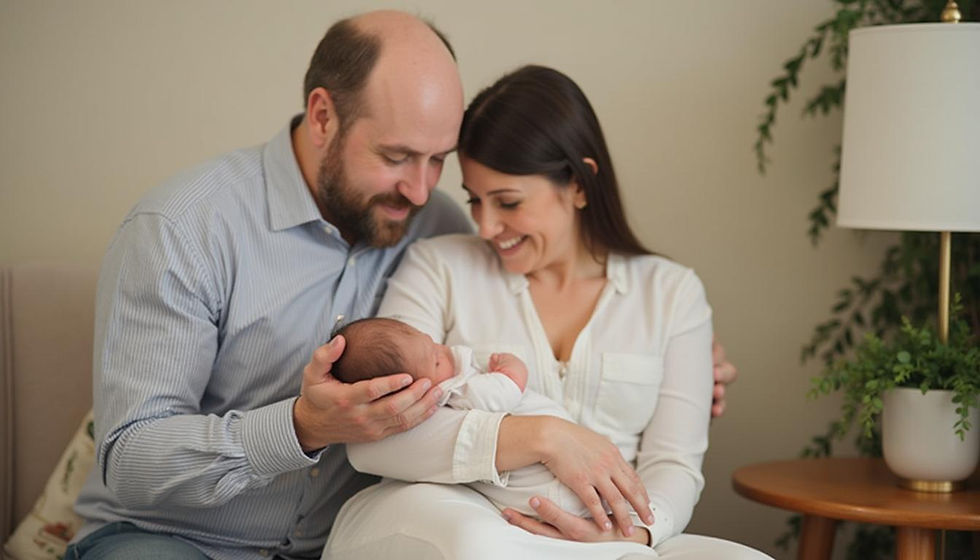How Egg Donor Compensation Averages Are Calculated?
- Sep 1, 2025
- 5 min read

Egg donation is a wonderful way to help someone start a family, and in New York, where it’s fully supported by law, many women are curious about how the average compensation for egg donation is figured out. Donating eggs takes time, effort, and care, and the payment reflects that commitment. For new mothers or anyone thinking about donating, understanding how the average compensation for egg donation is calculated can make the process feel clear and fair. Some might search for quick answers about “average compensation for egg donation,” but the numbers depend on a few key factors. In this article, we’ll explain how these averages are determined, what affects the pay, challenges to know about, and how Rite Options, a trusted New York agency, can guide you with kindness and clarity.
What Is Egg Donation?
Egg donation means a woman gives her eggs to help another person or couple have a baby, usually through a medical process called IVF. In New York, laws since 2021 make sure egg donors are treated fairly, with clear rules protecting everyone. Donors go through health checks, take hormone shots, and have a simple procedure to collect the eggs. They’re paid for their time and effort, not the eggs themselves, to keep things ethical.

The average compensation for egg donation varies based on things like where you live or your experience. Agencies like Rite Options help donors understand the process and ensure fair pay, making it easier to feel good about this special choice.
How Egg Donor Compensation Averages Are Calculated
The average compensation for egg donation is worked out by looking at what fertility clinics and agencies pay across New York and the U.S. Here’s how it’s usually done:
1. Starting Payment
Most clinics and agencies offer a base payment to cover the time, effort, and any discomfort from donating. In New York, this often starts at $10,000 to $20,000 per donation cycle, based on guidelines from groups like the American Society for Reproductive Medicine. Averages are calculated by looking at typical payments from trusted places, like Rite Options, which might offer up to $20,000 for first-time donors.
This base pay is the starting point for figuring out the average compensation for egg donation.
2. Where You Live
Pay can change depending on your location because living costs differ. In New York, especially in places like New York City, payments are often higher due to higher expenses and more demand. For example, city clinics might pay $15,000-$20,000, while smaller towns might offer $10,000. Averages come from combining data from agencies like Rite Options and clinics across the state.
This makes the average compensation for egg donation in New York higher than the national average of $10,000-$15,000.
3. Experience Matters
Donors who’ve done successful cycles—where their eggs helped create a pregnancy—can earn more, sometimes $20,000-$50,000 for later donations. Agencies track these successes and adjust pay. Averages include both new and experienced donors, depending on how common each is. Rite Options may pay more for repeat donors, which lifts the average compensation for egg donation.
4. Special Qualities

Some donors get extra pay because of things like their education, background, or unique traits. For example, donors with college degrees or certain ethnicities, like Asian or Jewish, might earn up to $50,000 in rare cases. These higher payments are less common but affect averages. Rite Options includes diverse donors, ensuring fair pay that shapes the average compensation for egg donation.
5. Extra Costs
Compensation often includes money for things like travel, missed work, or doctor visits. In New York, travel to clinics can add $100-$1,000 to the total. These costs are counted in averages since they’re part of what donors receive. Rite Options covers these expenses, so donors don’t pay out of pocket, which helps set the average compensation for egg donation.
6. Data from Clinics and Agencies
Averages are also based on information from fertility groups or surveys of what clinics and agencies pay. For example, a 2025 report might show national averages of $10,000-$20,000, with New York on the higher end. Agencies like Rite Options share their payment ranges, helping create a clear picture of the average compensation for egg donation.
Challenges in Figuring Out Averages

Calculating the average compensation for egg donation can be tricky because of these issues:
Different Pay Systems: Some clinics pay a set amount, while others might base it on how many eggs are collected, which can range from $10,000 to $12,000. This makes averages harder to figure out.
No Strict Rules: Guidelines suggest payments over $10,000 should have a reason, but there’s no fixed limit, so pay can vary a lot, especially for in-demand donors.
Hidden Costs: Not all agencies include things like travel or medical expenses in their reported payments, which can change averages.
Keeping It Fair: Some worry high payments might push women to donate for the wrong reasons, so agencies like Rite Options focus on clear, fair pay.
Rite Options helps donors understand these challenges, making sure pay feels fair and clear.
Tips for New Mothers Exploring Egg Donation
If you’re a new mother or thinking about donating eggs, here are simple ways to approach it:
Find a Trusted Agency: Work with a licensed agency like Rite Options to learn about pay, which often starts at $20,000, and the donation process.
Ask About Pay Details: Make sure you know what’s included, like travel or doctor visit costs, to understand the full payment.
Know the Time Commitment: Donating takes about two months, with health checks, hormone shots, and a quick procedure. Understanding this helps you appreciate the pay.
Check the Legal Side: In New York, payments are taxable, and agencies like Rite Options give you forms to report earnings.
Get Support: Talk to counselors or other donors through agency resources to feel ready. Rite Options offers support to guide you every step.
Contact Rite Options for Support

If you’re curious about egg donation or want to understand the average compensation for egg donation, Rite Options is here with kind, expert help. As a licensed New York agency, they offer clear details on payments, starting at $20,000 or more, and support you through health checks and matching. Their team provides consultations and answers your questions to make you feel comfortable. Contact Rite Options through their website (www.riteoptions.com) or call for a free consultation to learn more. Let Rite Options guide you to make a confident, informed choice.
Conclusion
Understanding how the average compensation for egg donation is calculated helps women feel valued for their generous choice. Things like starting pay, location, experience, and extra costs shape averages, often ranging from $10,000 to $20,000 in New York. Rite Options offers clear, caring support to ensure fair pay and a smooth process. By learning about compensation and preparing with help, you can feel good about helping others. Reach out to Rite Options today to start this rewarding journey with confidence and care.



Comments